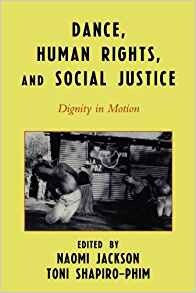Dance, Human Rights, and Social Justice
Subtitle
Dignity in Motion
Edited by Toni Shapiro-Phim and Naomi Jackson
'Dance, Human Rights, and Social Justice: Dignity in Motion' presents a wide-ranging compilation of essays, spanning more than 15 countries. Organized in four parts, the articles examine the regulation and exploitation of dancers and dance activity by government and authoritative groups, including abusive treatment of dancers within the dance profession; choreography involving human rights as a central theme; the engagement of dance as a means of healing victims of human rights abuses; and national and local social/political movements in which dance plays a powerful role in helping people fight oppression. These groundbreaking papers ― both detailed scholarship and riveting personal accounts ― encompass a broad spectrum of issues, from slavery and the Holocaust to the Bosnian and Rwandan genocides to the Israeli-Palestinian conflict; from First Amendment cases and the AIDS epidemic to discrimination resulting from age, gender, race, and disability. A range of academics, choreographers, dancers and dance/movement therapists draw connections between refugee camp, courtroom, theater, rehearsal studio and university classroom.
Bio
Naomi Jackson is an associate professor in the School of Film, Dance and Theatre in ASU's Herberger Institute for Design and the Arts.
Praise for this book
Jackson and Shapiro-Phim are the first to focus an investigation so cohesively on the political implications of movement. The result is a ground-breaking anthology that repositions understandings of the fundamental ways in which the dancer's body serves a range of human rights agendas from the oppressive to the corporate-controlled, nationalist, and liberatory. ... This book is of interest to an audience much broader than just those interested in the performing arts.
Southwest Journal Of Cultures, Summer Post 2, July 2009
A provocative collection of essays ... The editors have brought together a diverse collection of essays that, when read together, situate dance centrally within ideological discussions of what constitutes notions of freedom and social justice. More importantly, the essays will also spark discussion on who gets to define such concepts. "Dance, Human Rights, and Social Justice" is an ambitious and inclusive anthology that marks an important resource for anyone interested in dance, politics and social activism.
Dance Research Journal


